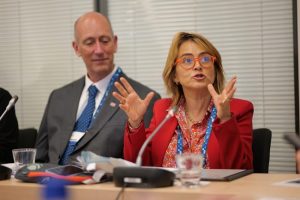In what looks like a major stride to ensure universal access to water and sanitation, the governments of Malawi and South Sudan on Monday, August 21, 2023, announced the launch of Presidential Compacts on Water and Sanitation.

The announcement was made at the Stockholm World Water Week, which gathered thousands of international leaders and experts this week to address the water and sanitation crisis.
Presidential Compacts on Water and Sanitation mark a significant step forward in improving public health, ending open defecation, and increasing climate resiliency. The Compacts are built upon clear commitments that encompass increased budget allocations, innovative sources of financing, and comprehensive plans for the construction of vital water and sanitation infrastructure.
Nigeria announced that it would be an official mentor country for Malawi and South Sudan’s new Presidential Compacts on Water and Sanitation.
The announcement was made by Dr. N.D. Madu on behalf of President Bola Ahmed Tinubu. Dr. Madu’s announcement was followed by praise from Cecilia Scharp of UNICEF and Catarina de Albuquerque, CEO of the UN-hosted Sanitation and Water for All (SWA) global partnership.
By announcing its intention to serve as a Compact mentor, Nigeria is providing its expertise in engaging Heads of State to ensure the prioritisation of water and sanitation.
Key Compact commitments include:
- Malawi: In support of the $145 million in funding received from the World Bank, the Compact will provide a blueprint for rebuilding water and sanitation infrastructure and enhancing climate resiliency following the devastation from Cyclone Freddy.
- South Sudan: The country has earmarked $56 million – equivalent to nearly 2% of the country’s GDP – to bolster their Compact strategies, which include empowering communities to end open defecation by 2030. They will also will expedite the passing of Water Bill 2014 to ensure a safe water supply.
The Compacts are part of the “Heads of State Initiatives” project, a groundbreaking effort aimed at advancing water and sanitation services worldwide, which was jointly launched during Stockholm World Water Week by the Government of the Netherlands, IRC WASH, the UN-hosted Sanitation and Water for All global partnership (SWA) and UNICEF. The partners will serve in an advisory capacity to the Compacts, providing critical technical expertise and coordinated advocacy.
Speaking at the launch event, the partners commended Malawi and South Sudan for their announcements.
Patrick Moriarty, CEO of IRC WASH, said: “Clean, safe drinking water and safely managed sanitation services aren’t just human rights, they’re fundamental building blocks for human and economic development and resilience in the face of climate change. They are fundamental to any country’s development and need to be given the highest priority – championed by heads of state, prioritized around the cabinet table.”
Catarina de Albuquerque, CEO of SWA, said: “To achieve water and sanitation for all by 2030, we’ll need a roughly six-fold increase in current rates of progress worldwide. However, we won’t get there without ambition, action and accountability from Presidents and Prime Ministers. Clean water and sanitation are fundamental human rights and essential for achieving secure stable resilient futures for every country. These Compacts demonstrate a collective commitment to transforming the lives of millions.”
Omar Abdi, Deputy Executive Director, Programmes, UNICEF: “Empowering children with access to safe water and sanitation is not just a commitment, but a testament to a brighter, healthier future. As governments unite in their pledge to increase access to these basic necessities, we provide not only access to safe water services and sanitation, but bridges to a world where children can thrive without the risk of waterborne disease or compromise their learning or safety while collecting water.”
